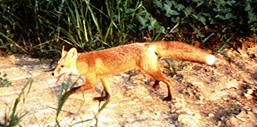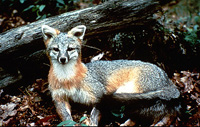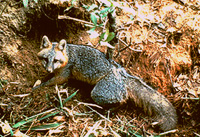Fox
Background Information
Foxes
are part of the dog family. They are well known chicken thieves.
That is why farmers set traps to catch foxes. Besides humans,
foxes have few enemies. However, a bobcat or coyote can be
seen feasting on a fox. They can be found throughout much
of the United States.
Physical
Features
Grey and
red foxes are the same size. They are about 2 feet in length.
Their bushy tails can add one foot to their overall length.
The fur of gray foxes is not all gray. They have reddish
fur along the entire underside of their bodies.
The fur
of the red fox is not all red. They have white fur on their
chests and stomachs and on the tips of their tails. Their
feet and legs have black fur. They have pointed noses and
short dog-like ears |


|
Life
Cycle
Foxes
mate in the late winter. It takes the babies about two months
to develop. From 2-7 pups are born blind
in a den and weigh about 3 ounces. Their
den could be a hollow log or tree trunk, or holes among the
rocks. Mother provides milk for her young for 4-6 weeks.
After
that time, father brings food to the entire family. Mother
teaches her young how to hunt. The family stays together
for about 5 months. Then, the young leave the den to mark
off their own areas. Foxes live about 6 years in the wild
and 12 years in a zoo. |
Habitat
When
it comes time to leave their dens, foxes mark off an area
of land with their urine and other body wastes. This smell
tells other foxes to stay out of its area.
The
red fox hunts on farmlands and forests with open area.
The red fox is active through the year. It can be seen
mostly in the early morning or late afternoon.
|
 |
The
grey fox is a very shy creature. It generally lives alone.
It is a very unusual dog in that it can climb trees. It often
rests, feeds, or hides in trees. In trees, the grey fox can
leap from branch to branch with ease. However, on the ground,
the grey fox is slower than the red fox and must use camouflage
to catch its prey.
Diet
Both kinds
of foxes hunt alone. They are omnivores.
That means that their food diet can be meat (live or dead),
fruits, insects, and eggs. They prey mostly
upon smaller mammals such as mice, rats, chipmunks, rabbits,
or squirrels. They will also attack birds and eat eggs. The
grey fox hunts during the night but the red fox hunts during
daylight hours.
|